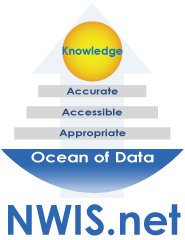|
|
|
|
|
|
|
Triple A Data
|
|
|
|

|
The quality of decisions cannot consistently rise above the quality of data
upon which those decisions are made. The volume of data that modern organizations
create is growing at an exponential rate and rapidly threatens to overtake a business's
ability to utilize it. The sheer volume makes data quality and accessibility a common
challenge.
|
|
|

|
A vast majority of business data exists in an unstructured format which resides
in multiple locations and can be exceedingly difficult to manage.
The approach and types of solutions that are available for managing the growth of
data continue to evolve, but nwis.net maintains a consistent philosophy for how
to manage data in an efficient and structured form.
This nwis.net-developed philosophy centers on ensuring all data is “Triple A” compliant.
The areas covered by the “Triple A” approach to data includes: Accurate, Accessible
and Appropriate.
|
|

|
|
|
|
|
|
|
|
Accurate
|
|
|
|
|
|
It may be possible to get a decision right by experience or gut instinct from time
to time. But over time, inaccurate or distorted data will absolutely affect the
quality of decisions being made based on it. In order to make better decisions,
it is worthwhile to improve data accuracy within the organization. Data, no
matter how accessible or appropriate, is of no value if it is not Accurate.
Traditional methods of trying to ensure accurate data entry are both labor and time
intensive. Any attempts at quality assurance usually end up being more like random
spot-checks of droplets within an expanding ocean of data.
In order to achieve success, any mechanism for maintaining high-quality data needs
to be embedded within the various layers of an application which, in turn, allows
an organization's various departments to work together. This also leads to full
confidence in the data by everyone who utilizes it.
The best long-term solutions involve the integration of automatic quality assurance
agents which instantly alert users of any discrepancies in the underlying data that
they input, receive or analyze. For existing data stores, nwis.net will work with
clients to analyze, correct and improve the utilization of data to transform data
that may currently be an ongoing liability into data that is a valuable asset.
|
|
|
|
|
|
|
|
|
Accessible
|
|
|
|
|
|
Ironically, the people who most need important information are often the ones most
separated physically from it. Managers who are responsible for multiple locations
are a common example of people who need to both collect and respond quickly to wide
variety of information in ways that will result in a lost opportunity or a newly
gained one. Data, no matter how accurate or appropriate, is of no value if
it is not accessible.
While technologies like mobile internet access are available, their coverage is
limited. And, depending on the services offered, the lack of reliability from multiple
locations along with its associated costs may prohibit any meaningful usage.
One cost-effective and innovative solution would be to utilize a unique nwis.net
technology known as Remote Data Collection Agents (RDCA). RDCA's are easily implementable,
XML-based browser components that are “always on” but “not always connected.” In
other words, a user interacts with an RDCA in the same way as any other application,
but it does not have to be connected via the Internet at all times. When the RDCA
is connected via any Internet or corporate network, it becomes “connected” and its
own data stores are automatically updated with the associated host database.
Accessibility frequently also means getting access to older data that may reside
in company mainframes or other legacy systems. nwis.net has a great deal of experience
in this realm and we rely on industry standard XML format conversions for any needed
transition between any older data processing computers and current enterprise systems.
|
|
|
|
|
|
|
|
|
Appropriate
|
|
|
|
|
|
One of the biggest challenges in any organization is to locate the most appropriate
information and to deliver it to the appropriate people at the appropriate time.
A well-designed application user interface is only one aspect of providing appropriate
data. Data, no matter how accurate or accessible, will only be a distraction if
it is not Appropriate.
Providing appropriate information deals with defining and serving not just core
transaction data, but other relevant supporting information which assists in any
range of decision-making processes regardless of whether it is for the field staff
or for the CEO.
The ability to use real knowledge to empower the corporation is not based on any
single piece of information. The fabric of useful knowledge comes from the fine
interweaving threads of data that create easily recognizable patterns. The picture
that emerges is the reality of your organization and its direction in its path toward
liabilities or profits, distractions or opportunities.
In other words, the real goal in defining and utilizing appropriate data is for
the formation of knowledge which will naturally increase an organization's competitiveness
and efficiency.
|
|
|
|
|
|
|
|
|
|
|
|
|
|
|